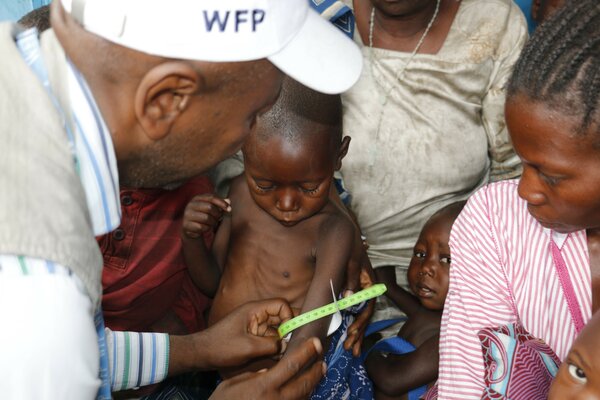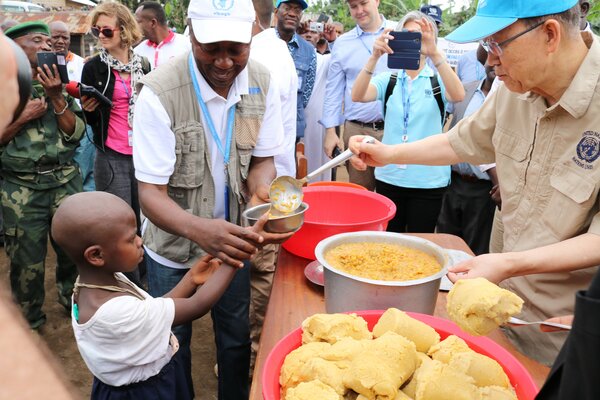‘It’s not business as usual here in Beni!’
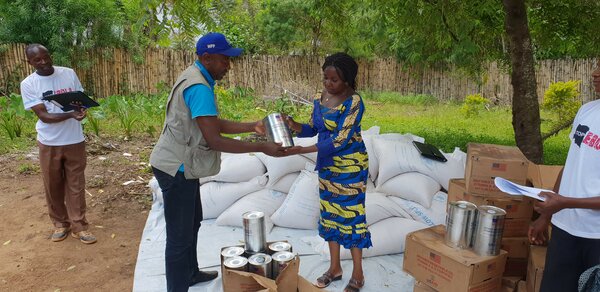
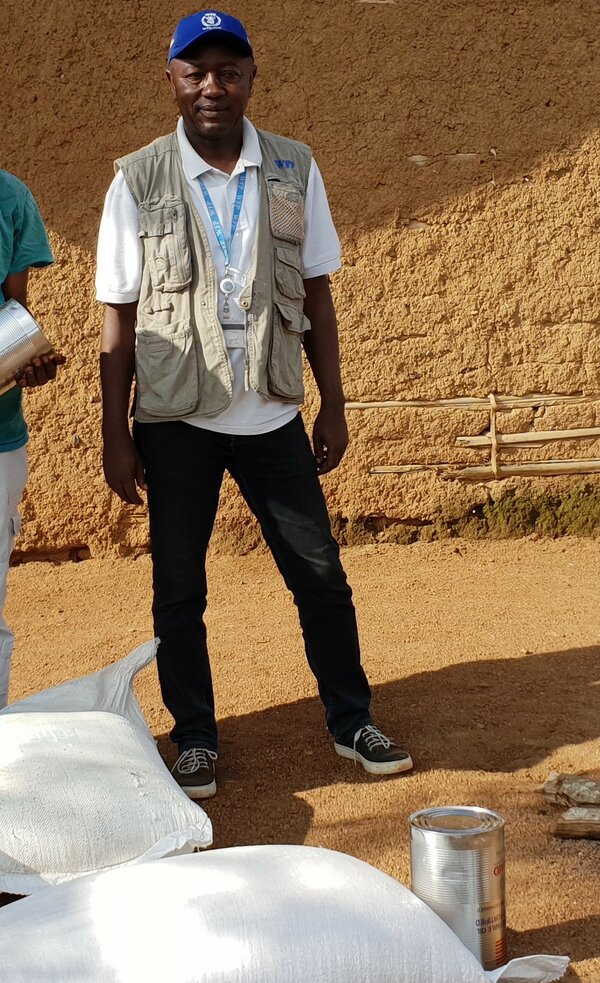
I'm a nutritionist and I've been working for the World Food Programme (WFP) since 2009. I'm currently based in the town of Beni, North Kivu province, as a first responder in the fight against the Ebola virus. I use the word fight on purpose because each passing day must be considered a battle — and a win — against the epidemic.
My days are stressful because we know that the virus is near. The workload is intense. Fortunately, Ebola is not transmittable by air, and all humanitarian staff deployed to Beni have been trained on how to prevent contamination in our day-to-day work. So for example, we avoid coming in contact with bodily fluids of infected people, we do not eat wild animals and we frequently wash our hands.
"It's both your life, and other people's life at stake here."
If you discipline yourself, your chances of contracting the Ebola virus are slim. The local population, however, is very stressed; you can feel the anguish all around. Tensions are also high because of insecurity in the Beni territory, especially in the east, due to the presence of active armed groups attacking and killing civilians in villages.
As a first responder, you need to maintain your emotional well-being on a daily basis by adopting healthy coping mechanisms. It's both your life, and other people's life at stake here.
The Coordination Commission for the response led by the Ministry of Health and by the World Health Organization (WHO) is located here in Beni. At the request of this commission, my role is to assess the food needs of patients, caregivers, children orphaned by Ebola and people who have been in direct contact with Ebola-infected people.
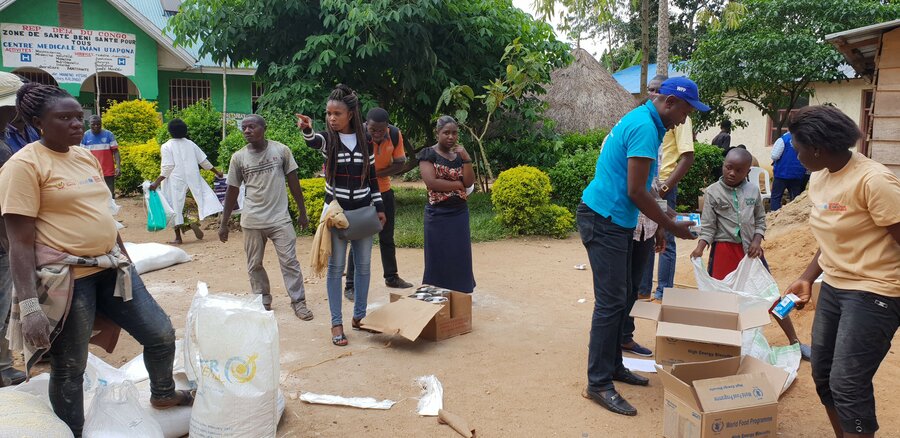
I also supervise food distributions carried out by both WFP and our partner on the ground, Caritas. In the DRC, we are used to large food distributions. For example in 2017, we distributed 12,000 tons of food to 418,000 hungry people. This year, WFP is reaching some one million vulnerable people throughout the country on a monthly basis. Now, on top of this, WFP has had to expand operations and food distributions to effectively respond to the Ebola epidemic.
"Simply, everyone needs food, people need to eat. So we deliver food to the doorstep of people who have been in contact with infected people."
Here in Beni, it's not business as usual! We go from village to village and from door to door with a list of names of people who have been in contact with infected people. This drop-by-drop approach is an important part of the response strategy. To avoid any risk of contamination, people need to remain at home and away from their marketplaces and community.
Simply, everyone needs food, people need to eat. So we deliver food to the doorstep of people who have been in contact with infected people. We deliver a food basket of corn flour, beans, vegetable oil, and salt. This kind of organization is already complicated but you also need to take into account people's sensitivities. Some are embarrassed to let others know they've been in contact with an infected person. Others are ashamed that family members have died from the Ebola virus. No one likes to advertise that Ebola might have infected him. In some parts of Beni, some people are hostile to the "Ebola doctors" as they are called. Sensitization to what Ebola is and what it is not is an essential task, undertaken during the general food distribution and home food deliveries.
"I like what I do here because we are really at the heart of a lifesaving operation."
The nutritional response is different too because WFP supports all patients affected by Ebola, including women and children who are already suffering from malnutrition. We have to adapt the food preparation to each patient, taking into account whether they can easily eat or not. Conflict and displacement have already had devastating consequences, contributing to high levels of acute malnutrition across the country. Under the Ebola response, we are continuing to promote "best nutritional practices" even though the area of Beni is weakened by quarantines. WFP is fighting both Ebola and malnutrition in the DRC.
I like what I do here because we are really at the heart of a lifesaving operation. We have reached 6,100 Ebola affected people in North Kivu and Ituri provinces with 106 tons of food so far, of which nine tons was special nutritional food.
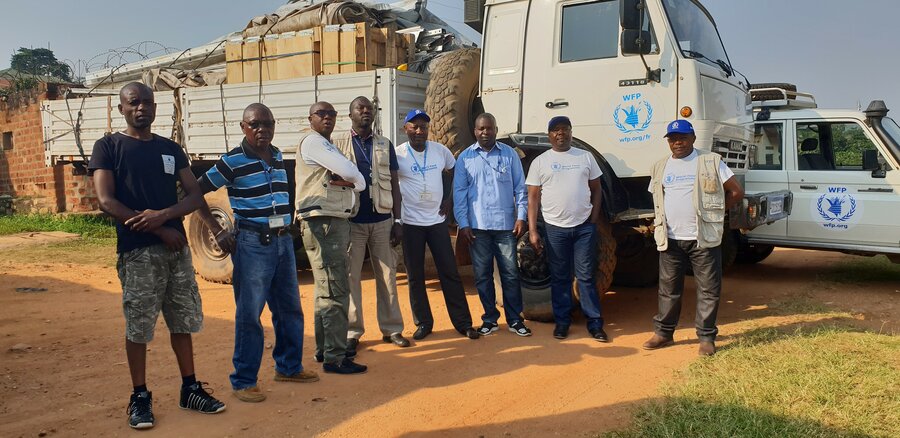
WFP's logistics support and expertise is critical. Three mobile warehouses have been deployed to Beni and we have seven trucks delivering medicine, food, cars, motorbikes, thermometers, refrigerators, tents, solar kits and mattresses to treatment centres. WFP aviation specialists are currently helping manage air traffic in and out of Beni, while WFP-run United Nations Humanitarian Air Service (UNHAS) operates daily flights between Beni and Goma.
"I have reasons to be optimistic that we will win against the 10th Ebola outbreak in 40 years in the DRC."
What I miss the most is my family. Fortunately, we can talk over the phone every day. They never miss an opportunity to remind me to follow the Ebola prevention measures very strictly.
I have reasons to be optimistic that we will win against the 10th Ebola outbreak in 40 years in the DRC. The medical and humanitarian staff on the ground are very experienced. The staff is very dedicated. There is no end to our commitment to saving lives.
Read more about WFP's work in the DRC.
